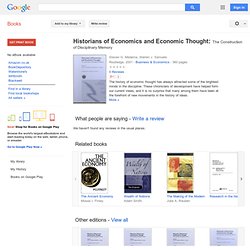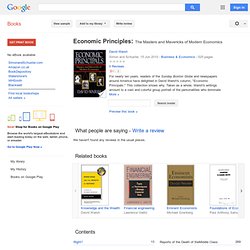

Historians of Economics and Economic Thought: The Construction of ... - Stephen Medema. The history of economic thought has always attracted some of the brightest minds in the discipline.

These chroniclers of development have helped form our current views, and it is no surprise that many among them have been at the forefront of new movements in the history of ideas. This notable collection summarizes the work of these key historians of economics and attempts to quantify their impact. Some of the writers covered, such as Friedrich Hayek and Joan Robinson, are already assured of their place among the greatest economists of the twentieth century, but the collection also stresses the influence of those still active in shaping our perceptions - including Mark Blaug, Samuel Hollander and Donald Winch.
Written by an impressive roster of contributors, many of whom are themselves well-known in the history of economic thought, this key book features writings from John Creedy, Roger Blackhouse and Neil De Marchi, as well as the editors of the collection as a whole, Warren J. More Heat than Light: Economics as Social Physics, Physics as Nature's Economics - Philip Mirowski. Rizvi_on_Mirowski. Economic Principals: Masters and Mavericks of Modern Economics - David Warsh. For nearly ten years, readers of the Sunday Boston Globe and newspapers around America have delighted in David Warsh's column, "Economic Principals.

" This collection shows why. Taken as a whole, Warsh's writings amount to a vast and colorful group portrait of the personalities who dominate modem economics -- from the luminaries to unknown soldiers to eccentrics who add sparkle to the tapestry. Partly a history of controversies in economics, partly an essay on the evolution of the field, Economic Principals offers a glimpse of one of the most important stories of our time: the metamorphosis of a priestly class of moral philosophers into the mathematical mandarins of today, whose ideas are reshaping society even as they reveal its workings in ever more subtle detail. Warsh first recounts the rise of the economic paradigm, deftly treating the rediscovery of Adam Smith and the centrality of markets.